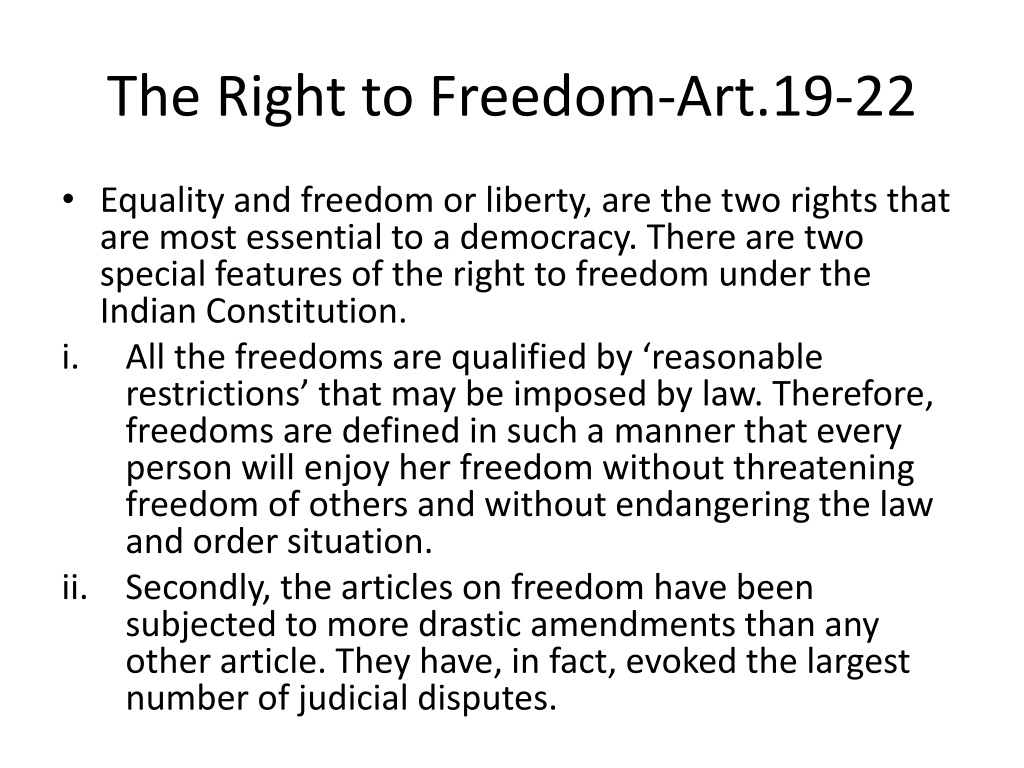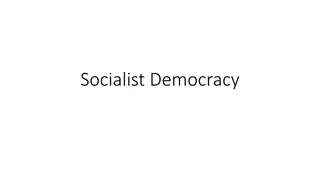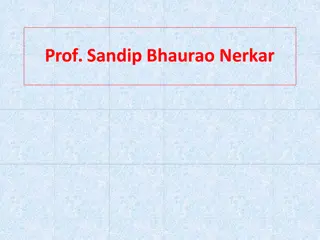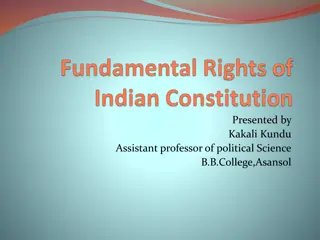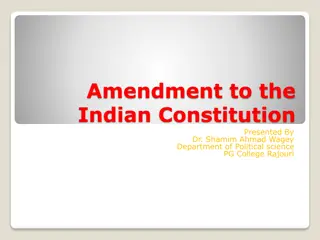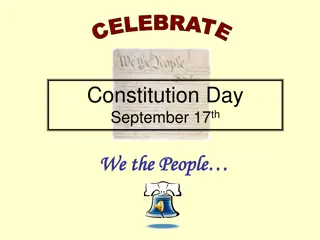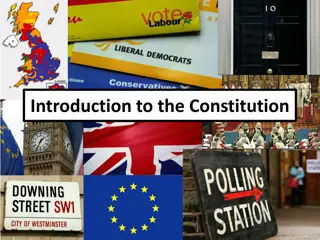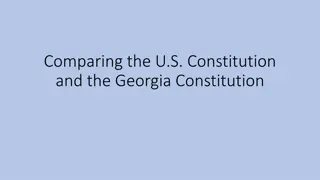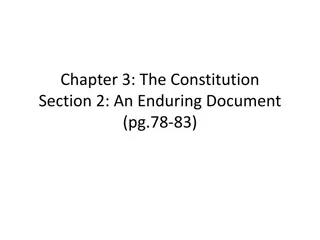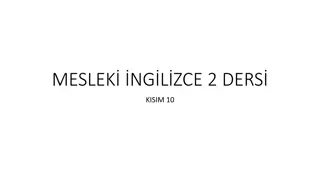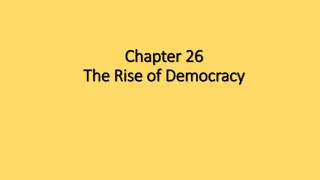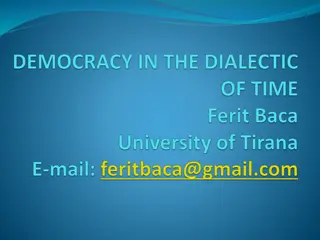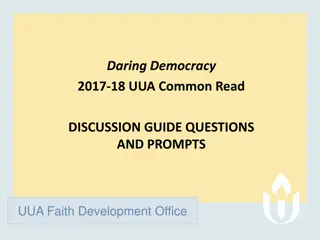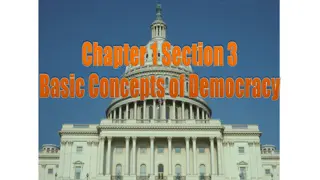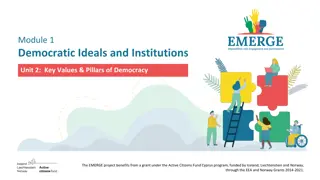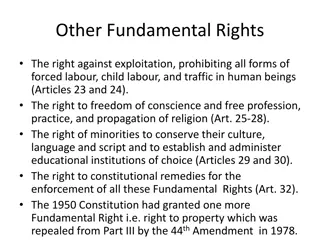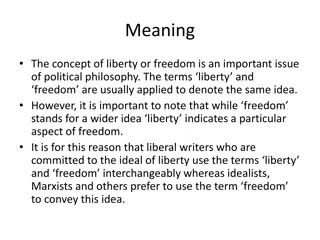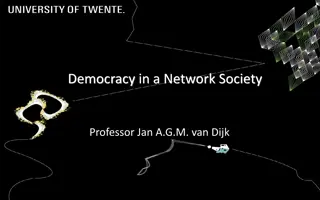Essentials of Democracy: The Right to Freedom under the Indian Constitution
Equality and freedom are crucial components of any democracy, with the right to freedom holding special significance in the Indian Constitution. This right is characterized by qualifications termed as 'reasonable restrictions', ensuring a delicate balance between individual liberties and societal interests.
Download Presentation

Please find below an Image/Link to download the presentation.
The content on the website is provided AS IS for your information and personal use only. It may not be sold, licensed, or shared on other websites without obtaining consent from the author. Download presentation by click this link. If you encounter any issues during the download, it is possible that the publisher has removed the file from their server.
E N D
Presentation Transcript
The Right to Freedom-Art.19-22 Equality and freedom or liberty, are the two rights that are most essential to a democracy. There are two special features of the right to freedom under the Indian Constitution. i. All the freedoms are qualified by reasonable restrictions that may be imposed by law. Therefore, freedoms are defined in such a manner that every person will enjoy her freedom without threatening freedom of others and without endangering the law and order situation. ii. Secondly, the articles on freedom have been subjected to more drastic amendments than any other article. They have, in fact, evoked the largest number of judicial disputes.
Six Freedoms in Art.19 Art.19, the first article in this category guarantees six freedoms to every citizen. These are: a) freedom of speech and expression; b) to assemble peacefully and without arms; c) to form associations or unions; d) to move freely throughout the territory of India; e) to reside and settle in any part of the territory of India; g) to practise any profession, or to carry on any occupation, trade or business. The 1950 Constitution had one more freedom related to property as clause (f). But it was omitted by the Constitution (forty-fourth Amendment) Act, 1978. These freedoms are recognized as the natural rights inherent in the status of a citizen .
Freedom of Speech and Expression Art.19(1) (a) guarantees to every citizen the right to freedom of speech and expression. Freedom of speech means the right to express one s opinions freely without any fear through oral speech, writing or broadcasting. This right includes right to press and filmmaking. Freedom of the press is regarded as the mother of all liberties in a democratic society. This is essential for the functioning of a democratic polity. Unless there is freedom for discussion of political as well as other matters, the polity cannot be termed democracy.
Reasonable Restrictions on Freedom of Speech and Expression As unrestricted freedom of speech and expression would amount to an uncontrolled license and could lead to disorder and anarchy, it is subject to reasonable restrictions under the following heads: i. Security of the state: it refers only to serious and aggravated forms of public disorder . Expression of views or making speeches which tend to incite or encourage people to commit violent crimes like murder or which tend to overthrow the state can be made punishable. ii. Friendly relations with foreign countries with a view to avoiding embarrassment to India through persistent and malicious propaganda. This ground, however, has been criticized for being susceptible of supporting regulations curbing even criticism of the government s foreign policy.
Reasonable Restrictions---(Contd.) iii. Decency or morality: this has been included as grounds for imposing restrictions on the freedom of speech and expression mainly to safeguard the society from depraved and corrupt actions or behaviour. But these terms do not have a clear or precise meaning and perceptions of morality or decency have changed from time to time. iv. Contempt of court: The underlying idea of this ground is to preserve the authority of courts in punishing for their contempt. But its usefulness depends on the wisdom and restraint with which it is used. Public criticism of a judgment can be stifled so long as it is fair, reasonable and legitimate.
Right to Life and Personal Liberty- Art.21 The foremost right among rights to freedom is the right to life and personal liberty. No citizen can be denied his/her life except by procedure as laid down under the law. Similarly no one can be denied his/her personal liberty. No one can be arrested without being told the grounds for such an arrest. If one is arrested, the person has the right to defend himself/herself by a lawyer of the person s choice. It is also mandatory for the police to take that person to the nearest magistrate within 24 hours. What is very important here is to note that various judgments of the Supreme Court have expanded the scope of this right. The Supreme Court has ruled that this right also includes right to live with human dignity, free from exploitation.
Preventive Detention Under ordinary circumstance a person would be arrested after s/he has reportedly committed some offence. However, there are exceptions to this. Sometimes a person can be arrested simply out of an apprehension that s/he is likely to engage in unlawful activity and thus be imprisoned for some time without following the above mentioned procedure. This is called preventive detention. If the government feels that a person can be a threat to law and order or to the peace and security of the nation, it can detain or arrest such a person. This preventive detention can be extended only for three months after which such a case is brought before an advisory board for review. But there is a fear that this provision can be misused and there is a clear tension between right to life and personal liberty and the provision for preventive detention.
